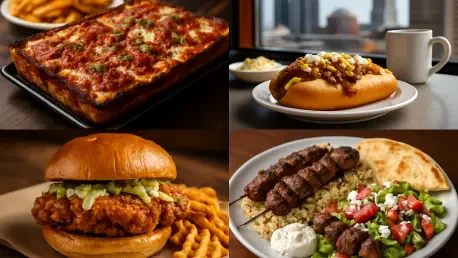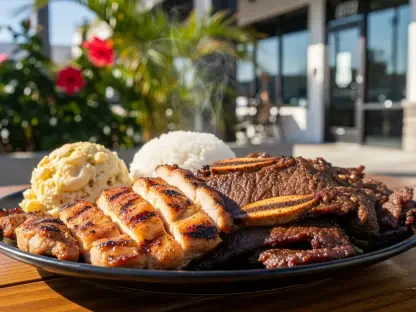Metro Detroit is experiencing a culinary renaissance, with an influx of new restaurants, inventive menus, and heartfelt community initiatives transforming the region’s dining landscape into a hub of innovation and flavor that reflects both personal dreams and broader societal shifts. From the bustling streets of Ferndale to the vibrant corners of Ann Arbor, local entrepreneurs are pouring their passion into ventures that resonate with the community. This surge of activity isn’t just about food; it’s about resilience, creativity, and a deep-rooted connection to the people who call this area home. As economic hurdles and competitive pressures loom, the hospitality scene responds with bold ideas and a commitment to making every meal memorable.
The diversity of cuisines popping up across the region speaks to a growing appetite for unique dining experiences, whether it’s smoky barbecue or reimagined comfort classics. Beyond the plates, there’s a noticeable push toward sustainability and inclusivity, with businesses aligning their practices to match evolving consumer values. Meanwhile, the beverage world is also seeing a fresh wave of creativity, from signature cocktails to non-alcoholic options that cater to mindful drinkers. Metro Detroit’s food and drink evolution is a story of adaptation, where every new opening or comeback adds a distinct chapter to an ever-unfolding narrative.
Fresh Flavors and New Beginnings
Ferndale’s Barbecue Boom and Beyond
In Ferndale, a smoky new addition is heating up the local scene with Dana Taucher’s Smokehaus Ferndale, a barbecue haven that’s finally opened its doors after overcoming initial setbacks. This venture, set in a space that’s seen its share of turnover, offers a menu that balances traditional meats with inventive twists like cauliflower burnt ends, appealing to a wide range of diners. Taucher’s confidence in the area shines through not only in this project but also in her management of Syndicate Ferndale and her plans for a third concept in a nearby vacated spot. The arrival of Smokehaus signals more than just a new eatery; it’s a testament to the enduring potential of Ferndale as a culinary destination, where bold ideas can take root and thrive amid a challenging market.
Just a short drive away in Clawson, Aaron and Heaven Cozadd are crafting their own culinary legacy with Red & the Wolf, a restaurant that promises to elevate Midwest fare with a global flair. Their menu teases eclectic dishes like Peruvian chicken pizza alongside plant-based offerings, catering to diverse tastes while staying true to regional roots. The personal touch behind the name, inspired by the couple’s nicknames, and their deep connection to Clawson as their home base, infuse this venture with an emotional resonance that sets it apart. This opening reflects a broader trend of entrepreneurs embedding personal stories into their businesses, creating spaces that feel like an extension of family and community rather than just another dining option.
Innovative Ventures in Unexpected Places
Another layer of Metro Detroit’s dynamic food scene unfolds with establishments that are redefining what dining can mean in less expected locales. The energy of new openings isn’t confined to urban hotspots but spills into surrounding areas, bringing fresh concepts to neighborhoods hungry for something different. These ventures often carry a sense of discovery, inviting patrons to explore beyond familiar haunts. The focus on unique culinary identities helps these spots stand out, drawing in crowds eager for novel experiences that blend tradition with modern creativity.
Moreover, the strategic choice of location by many of these new players highlights a keen understanding of local demographics and untapped markets. By setting up in areas ripe for growth or revitalization, restaurateurs are not just betting on their menus but on the potential of the communities they join. This approach often fosters a symbiotic relationship, where the success of the restaurant fuels local economic energy, and vice versa. The ripple effect of such openings can transform entire blocks, turning quiet streets into buzzing destinations for food lovers across the region.
Stories of Grit and Transformation
Comebacks and Creative Pivots
In Detroit, the journey of Rose’s Detroit under Molly Mitchell’s stewardship stands as a powerful example of resilience in the face of adversity within the hospitality industry. After navigating multiple closures, Mitchell has relaunched the eatery with a distinctive Polish-inspired menu, featuring creative dishes like Polish nachos that blend cultural heritage with contemporary flair. This pivot isn’t just a menu change; it’s a strategic move to carve out a unique niche in a competitive landscape, demonstrating how adaptability can turn setbacks into stepping stones. The story of Rose’s Detroit resonates as a beacon of hope for other struggling establishments, showing that reinvention can breathe new life into a faltering business.
Beyond the specifics of one restaurant, this trend of transformation speaks to a wider pattern among Metro Detroit’s culinary players, where necessity sparks innovation in unexpected ways. Many owners are rethinking their approaches, whether through overhauling menus or reimagining the dining experience to align with current consumer desires. The ability to pivot, as seen in Mitchell’s bold shift to Polish comfort food, underscores a critical survival skill in an industry known for its volatility. Such reinventions often attract renewed interest from locals and visitors alike, proving that a willingness to change can rebuild customer loyalty and secure a foothold in a crowded market.
Overcoming Industry Challenges
The hospitality sector in Metro Detroit faces constant challenges, from economic pressures to shifting consumer behaviors, yet many establishments are finding ways to endure through sheer determination. The high rate of turnover in restaurant spaces serves as a stark reminder of the risks involved, but it also opens doors for fresh ideas and determined entrepreneurs willing to take a chance. Those who succeed often do so by listening closely to their communities, ensuring their offerings resonate on a personal level while addressing practical concerns like affordability and accessibility.
Additionally, the financial and operational hurdles that threaten closures are being met with creative problem-solving, as restaurateurs explore partnerships, pop-up events, and hybrid business models to stay afloat. This adaptability is crucial in an environment where one misstep can lead to shuttered doors, but it also fosters a culture of experimentation that keeps the dining scene vibrant. By leveraging local support and staying attuned to market shifts, many businesses are not just surviving but setting new benchmarks for what it means to operate in such a demanding field.
Commitment to Community and Sustainability
Dining with Purpose
In Ann Arbor, Echelon Kitchen & Bar is setting a high standard for sustainable dining under the leadership of bar manager Max Schikora, whose commitment to zero-waste principles is reshaping how restaurants approach their environmental footprint. By prioritizing seasonal, locally sourced ingredients, the establishment minimizes waste while maximizing flavor, aligning with a growing consumer demand for eco-conscious practices. Schikora’s personal dedication to sobriety and involvement in Ben’s Friends, a support group for hospitality workers in recovery, further enriches the venue’s mission, creating a space that nurtures both the planet and its people. This dual focus on sustainability and community care positions Echelon as a model for how dining can serve a greater good.
Meanwhile, in Detroit, Anchor Bar exemplifies the power of community support through a heartfelt initiative that offered free meals to federal workers during a government shutdown, reinforcing its role as more than just a place to eat. This gesture highlights how established venues can act as lifelines during tough times, strengthening bonds with locals who remember such acts of kindness. The impact of Anchor Bar’s outreach goes beyond immediate relief, fostering a sense of loyalty and trust that can sustain a business through fluctuating economic conditions. It’s a reminder that in Metro Detroit, restaurants often serve as community anchors, providing nourishment for both body and spirit in times of need.
Building Stronger Local Ties
The emphasis on community engagement extends across various establishments, where the connection to local residents is becoming a cornerstone of business strategy. Many restaurateurs are actively seeking ways to give back, whether through charity events, partnerships with local suppliers, or initiatives that address social issues. This approach not only enhances their reputation but also builds a network of support that can weather industry storms. The mutual benefit is clear: businesses thrive when communities feel invested in their success, creating a cycle of goodwill that uplifts everyone involved.
Furthermore, the integration of local culture into the dining experience adds a layer of authenticity that resonates with patrons seeking genuine connections. From naming conventions that reflect personal histories to menus inspired by regional traditions, these touches make each visit feel like a shared story. This trend of embedding community values into business practices is gaining momentum, as diners increasingly value establishments that reflect their own identities and priorities. In Metro Detroit, the food scene is proving that heartfelt ties can be just as important as culinary excellence in building lasting success.
Looking Back and Moving Forward
Reflecting on a Dynamic Journey
Looking back, Metro Detroit’s food and drink landscape revealed a remarkable blend of innovation and perseverance as restaurateurs tackled economic uncertainties with bold new concepts and heartfelt community efforts. The openings of places like Smokehaus Ferndale and Red & the Wolf marked significant milestones, bringing diverse flavors to eager diners. Stories of resilience, such as the relaunch of Rose’s Detroit, captured the spirit of an industry that refused to stay down, while initiatives at Echelon Kitchen & Bar and Anchor Bar underscored a commitment to sustainability and local support. Each chapter of this evolving narrative painted a picture of a region where culinary passion met practical challenges head-on.
Charting the Next Course
As the journey continues, the focus shifts to sustaining this momentum through strategic adaptation and deeper community integration. Restaurateurs might consider exploring collaborative ventures or pop-up experiences to test new ideas without the full risk of permanent spaces. Embracing technology, such as digital platforms for customer engagement, could also enhance visibility and loyalty. Above all, maintaining a balance between innovation and the personal touches that define Metro Detroit’s dining culture will be key. The path ahead invites a continued celebration of diversity in cuisine and purpose, ensuring that every new venture adds value to both the plate and the people around the table.









